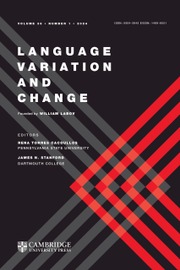Article contents
Attitudinal and sociostructural factors and their role in dialect change: Testing a model of subjective factors
Published online by Cambridge University Press: 16 May 2011
Abstract
The causation of language change is a problem with a high profile in sociolinguistics. This paper presents two contrasting models of language change: one that is based on sociopsychological factors (Kristiansen & Jørgensen, 2005) and one that rejects them (the Napoleon Principle, Brink & Lund, 1979). In a longitudinal study of individuals' changing pronunciation of the Danish aj-diphthong over 20 years, we test predictions following from the sociopsychologically oriented model. By the mid-1980s, female speakers used more aj-pronunciations that are associated with high socioeconomic status than did male speakers. However, in guise tests, females revealed a more positive attitude toward speech associated with low socioeconomic status. Our prediction that female speakers would change their speech patterns to include more aj-pronunciations associated with low socioeconomic status is supported by an analysis of the same female speakers' pronunciations as recorded in the mid-2000s.
- Type
- Research Article
- Information
- Copyright
- Copyright © Cambridge University Press 2011
References
REFERENCES
- 6
- Cited by


